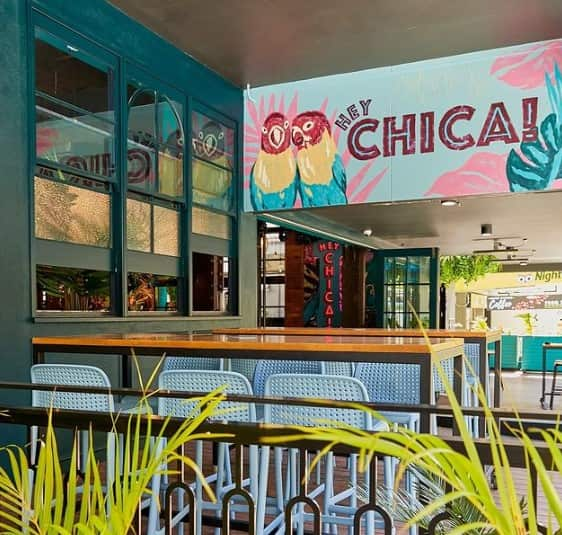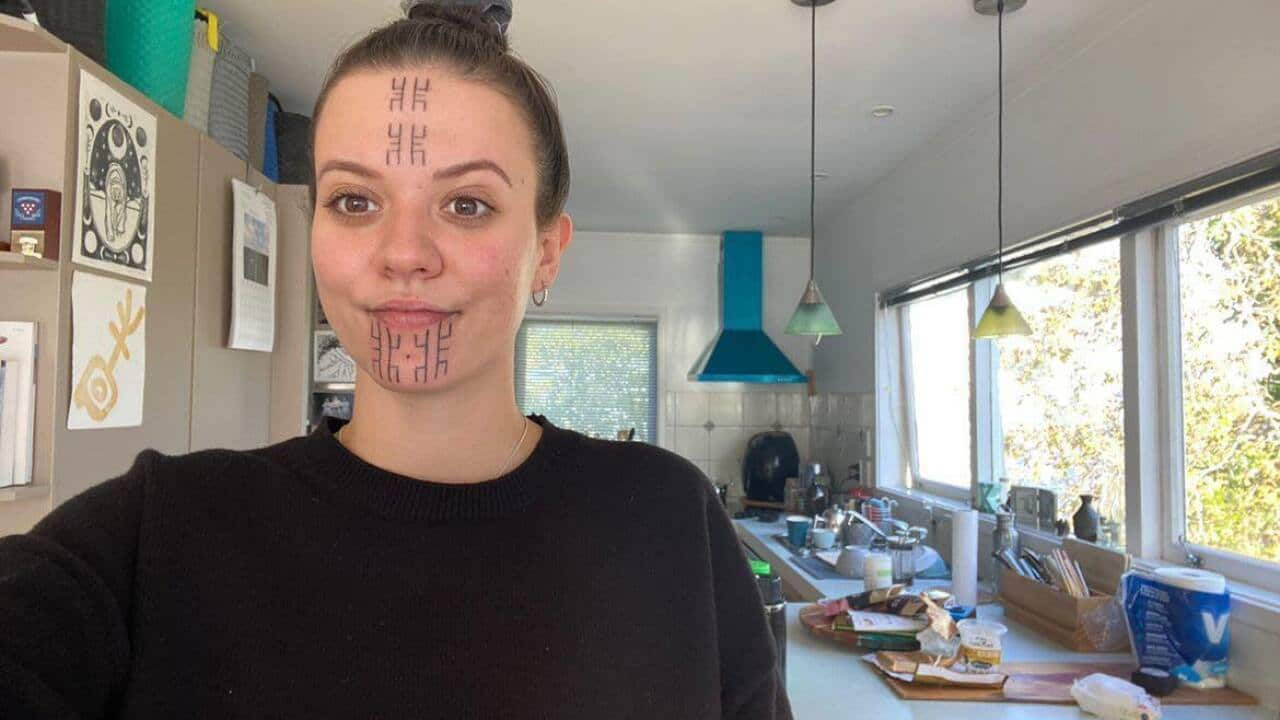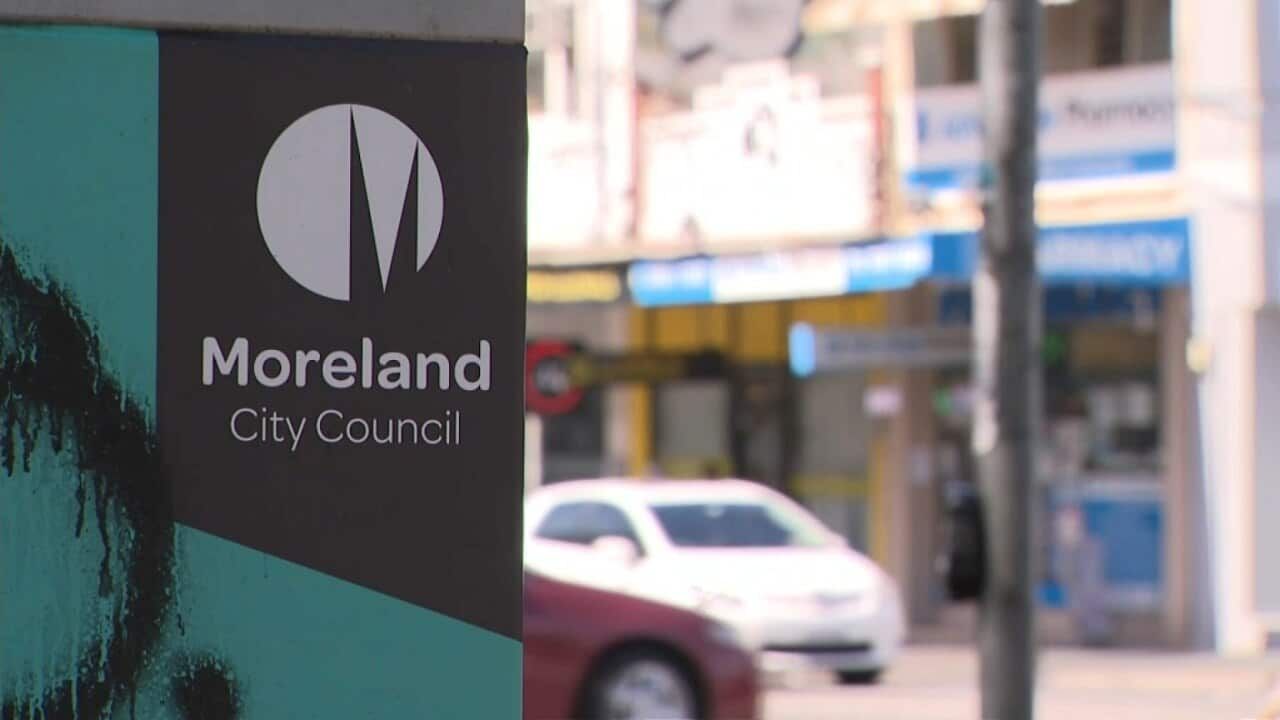On Saturday night, in the midst of celebrating her partner’s birthday in Fortitude Valley, Moale James was turned away from a bar because of her face.
The 23-year-old Papuan woman’s face is marked with reva reva – a powerful cultural tattoo that has been used to mark Indigenous women in Papua New Guinea for centuries.
"I said to my friends before we left the house, that I don't know how it will go. I had been prepped beforehand, when getting my marks. My family said that I would probably experience a bit of backlash,” she told NITV News.
"I knew there were stories of people not being able to get into nightclubs, so I told my friends that that could happen.
"I hoped that if I explained that they were cultural tattoos, it would be ok."
Ms James handed her license to the security guard at the door of Hey Chica!, a popular bar along Brunswick Street.
“He looked at it, then looked at me and said I'm not going to let you in because of your face,” she said.
"I thought, ok this is the moment. I explained they were cultural and he still said no, because of my face.”
A staunch woman, Ms James said she’d usually advocate for herself in these moments, but became very aware that she was a “brown woman in Fortitude Valley” and that there were police close by.
She walked away.
The meaning behind the marks
At only 15, Ms James received her first reva reva. A month ago she travelled with her mother to New Zealand to receive her facial reva reva – a big moment in her life.
“Because of COVID restrictions we unfortunately aren't able to travel to Papua New Guinea, we travelled to New Zealand to see my Aunty Julian who is our marking artist. She has done all of my marks,” she said.
Her facial reva reva signifies her graduation from university.
“This marks a point in time where i am stepping into my career,” she explained.
"All of my marks they signify a specific moment in time, it might be just entering high school, or for when I got my thighs marked I was working on a story about sexual assault in university campus. I got those marks to signify stepping forward with those stories.
"I got my arms done, just after i graduated high school.”
Whilst all her marks are special, her facial reva reva was particularly powerful for the young Papuan woman.
“We mark our faces because we want to acknowledge our ancestors and our Old People,” she said.
“It's a symbol of love for your Old People.”
The sense of responsibility wasn’t lost on her.
"Carrying those marks, I feel a great sense of responsibility that this is the message I am sending to everyone,” she said.
“There is always responsibility when carrying marks, but specifically for the most recent ones, that responsibility is even higher because it's on my face, it's the first thing people will see when they meet me.
"Every single time I have been marked I've cried, but this time I didn't. I just felt a lot of pride for Elders, to carry their stories on my face is so powerful. Everyone that I meet will see not just me, but also them."

Moale James receiving her facial reva reva. Source: Supplied
Hey Chica’s response
Before leaving the venue Ms James uploaded an Instagram story about what had happened, a groundswell of support gathered quickly.
"I took a photo of the venue and posted it on my Instagram saying the security guard had refused me entry because of my reva reva and that I'd be in contact tomorrow. It blew up overnight, I didn't expect it,” she said.
After contacted the venue wanting clarity on the incident the evening prior, Ms James received a response.
Ms James briefed the response, noting it “was short”.
“Thank you for sharing your experience and for understanding that the staff at Hey Chica! were following procedure,” the bar responded.
“While we appreciate that our rule has caused you unintended distress, we do enforce a blanket policy that prohibits head and face tattoos at Hey Chica! alongside other conditions of entry. While we understand this is a strict policy, we will continue to enforce it under the Liquor Act.”
This was the last contact Ms James received from the business.
"They've now turned off their comments because community jumped onto their posts, they won't let me tag them in anything,” she said.
“I tried to get an answer from them about their policy, I asked them about the legalities of the policy they're trying to refer to.
"I didn't get any response.”
NITV News contacted Hey Chica! for comment. However, did not receive a response.

Hey Chica! bar in Fortitude Valley has been called out on social media for refusing entry to Ms James on the basis of her cultural tattoos. Source: Instagram
The issues with the Act
Ms James decided to turn her attention to the policy Hey Chica! referenced.
"I have friends and family who are lawyers, who understand the law. We looked at it, and it's confusing because it was written years ago during the time when Queensland had issues with bikie gangs,” she said.
"The law is older than I am.”
A Queensland Liquor license allows the licensee and their staff to refuse service on four grounds: if the law requires it, safety of the patron, safety of others and if the licensee considers it warranted “provided it is not discriminatory”.
It advises that patrons who feel they are subject to discrimination are able to take the matter to the Queensland Human Rights Commission – which is what Ms James has decided to do.
"Initially I said I wanted a written apology, because what happened was discriminatory. All it would have took at the start was an apology, but they weren't interested,” she said.
"This fight is going to be a long one, but I want an amendment to policy, one that isn't confusing and one that is conscious of the multicultural society that they are trying to cater too.”
For Ms James and her family, the weight of standing up against what happened is one they know too well.
“I’ve had a lot of people asking me to explain how it’s racist. My answer is, well, if you can’t figure out how it’s racist – that’s on you,” she said.
“My grandparents were married in a time when Black women and white men weren't allowed to be married. We know that things like this exist, we know that to fight the systems, you have to fight how they respond,” she said.
"I know that this isn't likely that people will stop going to the bar . . . They can keep doing what they’re doing but the community that matters won't support them.”

Moale James with her mother and her aunty receiving her facial reva reva. Source: Supplied














